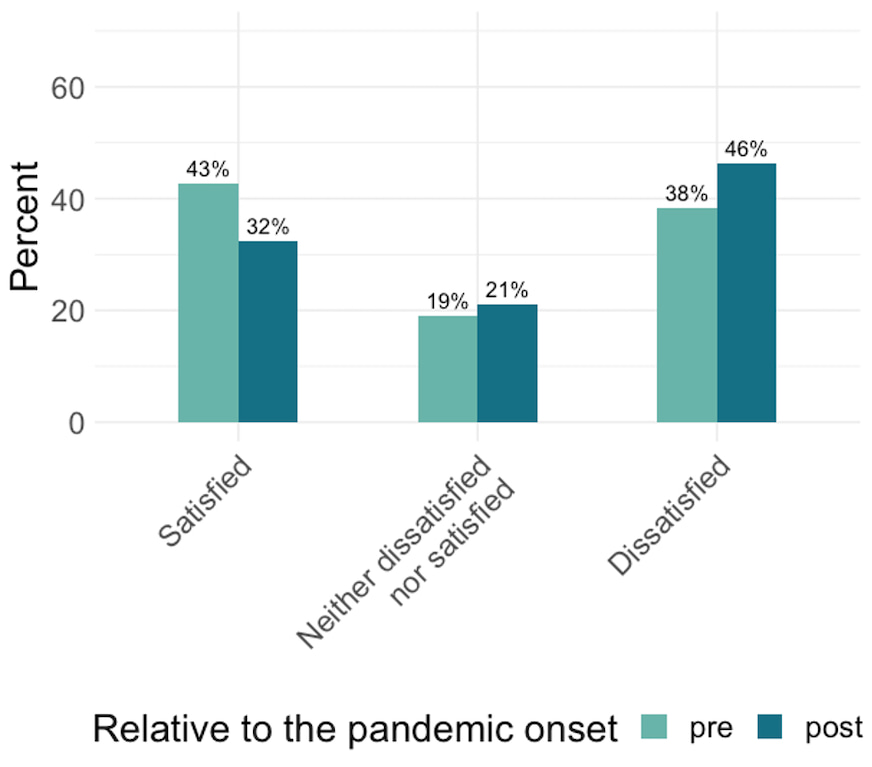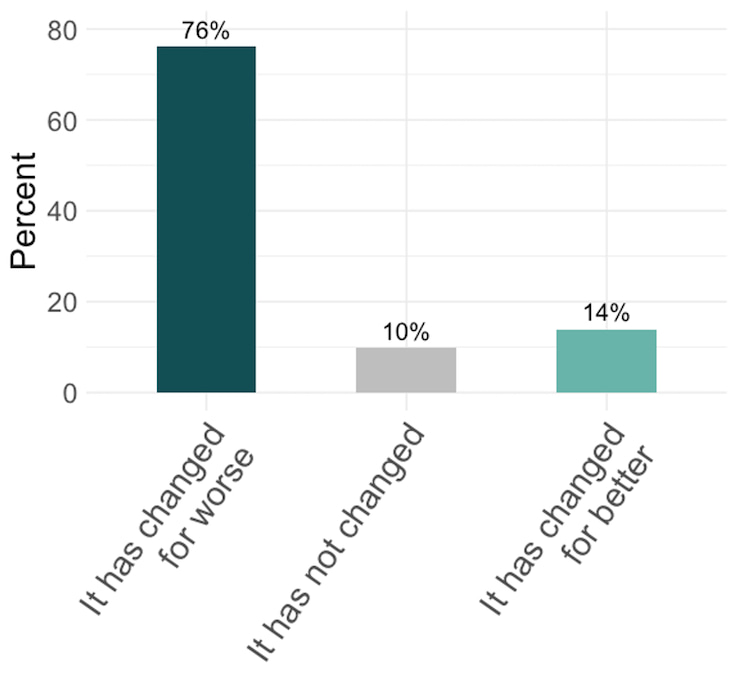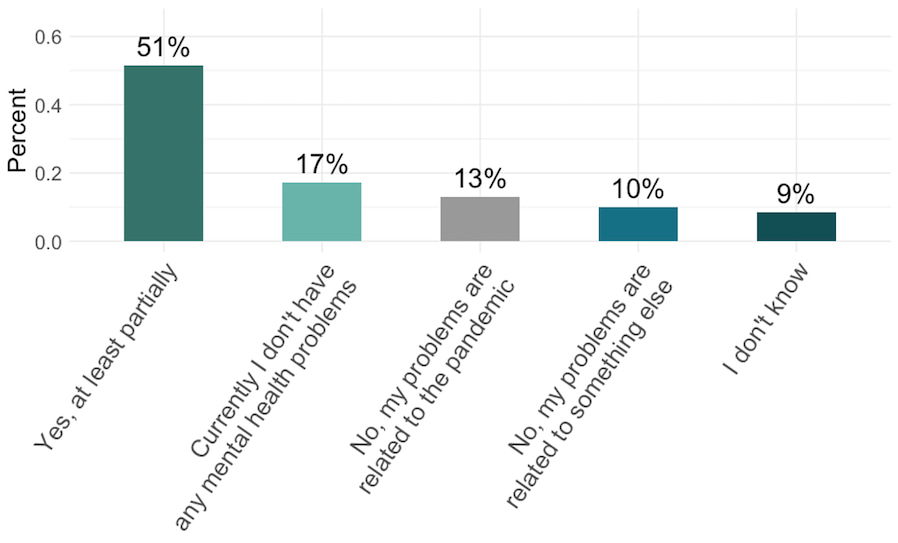When crisis hits crisis: Doctoral researchers’ mental health and PhD training satisfaction during the German COVID-19 lockdown
Published in Neuroscience

When the COVID-19 pandemic started in 2020, academia was already facing its own mental health crisis (Evans et al., 2018) for several years. Mounting evidence suggested that working in academia might contribute to mental health problems (Evans et al., 2018; Woolston, 2019). Especially doctoral and early postdoctoral researchers were shown to be at risk for mental disorders: prevalence rates of anxiety and depression were up to three times higher than in the general population (Satinsky et al., 2021; Barreira et al., 2018; Jacobi et al., 2014). Consequently, the discussion of causes and possible remedies of this crisis has since flared up.
One year later, in the beginning of 2021, a new lockdown had been imposed on Germany. During this time, we conducted an online survey to assess the mental health status and PhD training satisfaction of doctoral researchers in the Berlin area. We asked participants to evaluate their current as well as their pre-pandemic mental health and PhD training satisfaction. Data of 222 international ECRs from various research fields was used for our analyses.
Our results show that satisfaction with the PhD training (Fig 1) as well as overall wellbeing (Fig 2) decreased during the pandemic. Intriguingly, half of the sample indicated that their mental health problems were (at least partially) related to their PhD training (Fig 3). Alarmingly, the whole sample showed high levels of personal and work-related burnout. A fifth of the sample indicated clinically meaningful levels of depressive symptoms and almost 25% experienced severe loneliness. When exploring predictors of depression, anxiety, and burnout, we identified that low satisfaction with the PhD training was the most prominent predictor for all three conditions.

Overall satisfaction with the PhD training before and
during the pandemic.
Answers including “very”and “somewhat” for both
“satisfied” and “dissatisfied” were collapsed.

Figure 2
Mental wellbeing in the pandemic relative to pre-pandemic.
Answers including “significantly” and “slightly” for both “worse”
and “better” were collapsed.

Figure 3
Mental health problems in relation to the PhD training. Participants were asked whether they think
that their current mental health problems are related to their PhD training.
Taken together, our study shows that the situation of ECRs’ mental health worsened during the COVID-19 pandemic. Being problematic before, aspects related to the PhD training were boosted through the impact of this event. Our study implies that adjustments in the academic system are necessary to establish a healthy work-life balance and to increase PhD training satisfaction. First bottom-up attempts, often conducted by single researchers or initiatives founded by ECRs (e.g., German ECR initiatives like N2, Scholar Minds), have been made to reduce harmful work conditions and to destigmatize mental health matters in academia. Successes can be seen as the “mental health crisis in academia” has entered the scientific discourse. Nevertheless, to improve the situation – not only for early career researchers – systemic changes are needed from the top. Thus, we propose to challenge the current working conditions in research facilities in order to promote a healthy work environment in academia. Based on our findings and previous research, we propose six factors to improve the working conditions for ECRs. These factors are not exclusively tied to improving the situation regarding the COVID-19 pandemic but relate to more general aspects of ECRs’ mental health: 1) Providing institutional mental health support, 2) fostering work-life balance, 3) improving quality of supervision, 4) providing career perspectives and transferable skills, 5) growing a social network, and 6) fostering self-efficacy. A detailed discussion of these aspects can be found in Naumann et al. (2022).
Related work: https://www.nature.com/articles/s41598-022-26601-4
OSF repository: https://osf.io/q5w4g/
ECR initiatives:
Scholar Minds: https://www.scholar-minds.net
N2 : https://www.phdnet.mpg.de/n2
Photo by Mikhail Nilov: https://www.pexels.com/photo/a-boy-wearing-long-sleeves-sweater-pulling-his-hair-7929277/
References:
-
Evans, T. M., Bira, L., Gastelum, J. B., Weiss, L. T. & Vanderford, N. L. Evidence for a mental health crisis in graduate education. Nat. Biotechnol. 36(3), 282–284. https://doi.org/10.1038/nbt.4089 (2018).
Photo by Mikhail Nilov from Pexels: https://www.pexels.com/photo/a-boy-wearing-long-sleeves-sweater-pulling-his-hair-7929277/ - Woolston, C. PhD poll reveals fear and joy, contentment and anguish. Nature 575, 403–406 (2019).
- Satinsky, E. N. et al. Systematic review and meta-analysis of depression, anxiety, and suicidal ideation among Ph.D. students. Sci. Rep. 11(1), 1–12. https://doi.org/10.1038/s41598-021-93687-7 (2021).
- Barreira, P., Basilico, M., Bolotnyy, V. Graduate Student Mental Health: Lessons from American Economics Departments. Working Paper. (2020). https://scholar.harvard.edu/bolotnyy/publications/graduate-student-mental-health-lessons-american-economics-departments.
- Jacobi, F. et al. Mental disorders in the general population. Study on the health of adults in Germany and the additional module mental health (DEGS1-MH). Nervenarzt 85(1), 77–87. https://doi.org/10.1007/s00115-013-3961-y (2014).
Follow the Topic
-
Scientific Reports

An open access journal publishing original research from across all areas of the natural sciences, psychology, medicine and engineering.
Your space to connect: The Psychedelics Hub
A new Communities’ space to connect, collaborate, and explore research on Psychotherapy, Clinical Psychology, and Neuroscience!
Continue reading announcementRelated Collections
With Collections, you can get published faster and increase your visibility.
Reproductive Health
Publishing Model: Hybrid
Deadline: Mar 30, 2026
Women’s Health
Publishing Model: Open Access
Deadline: Feb 28, 2026


Please sign in or register for FREE
If you are a registered user on Research Communities by Springer Nature, please sign in